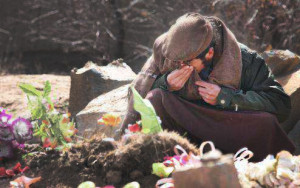
On the same day a NATO spokesman described the incident as “side effect” of the US military operation, that allegedly was not targeting the hospital, hence it was “accidentally hit.” Nevertheless, the official failed to provide journalist with details on what exactly the US aircraft was supposed to destroy. After all, according to MSF personnel, at the time of bombing Taliban militants were nowhere near the hospital
The UN High Commissioner for Human Rights Prince Zeid Ra’ad Zeid Al-Hussein on October 3 urged the international community to carry out a full investigation of the air strikes in question. And if it is to established that the hospital was struck intentionally, it would be only logical to label this act as a war crime. UN Secretary General Ban Ki-moon said that the hospital and its medical staff are protected by international law, and those responsible should answer for this bombing. There’s still hope that war the war criminals behind this attack won’t be able to escape the prosecution easily.
However, one should be reminded this was not the first case of US military committing crimes in Afghanistan and the neighbouring countries. Yet, all investigations of such “acts” have fallen short of punishing those responsible, which only leads to a sharp increase in the level of recklessness shown by Pentagon and US intelligence servicemen.
In particular, it is unlikely that the events of July 12, 2007 in the Iraqi capital of Baghdad will be forgotten any time soon. On this day two US helicopters gunned down almost two dozen people in cold blood, including two Reuters reporters. This tragedy – a vivid example of the so-called “side effects” or “collateral damage” that accompanies US military operations abroad. In April 2010, a 39-minute video of the shooting was published by WikiLeaks and various social networks provoking a loud public outcry. Pentagon carried out an “investigation”, but the US military officials concluded that the actions of pilots in question didn’t break the laws of armed conflicts and US own “rules of engagement”, therefore those killed were yet another case of “collateral damage” being inflicted.
This same “collateral damage” has been particularly severe in Afghanistan, where a US Sergeant Robert Bales on March 10, 2012 opened fire on more than 15 civilians in the Kandahar province, leaving all of them dead. However, the chief of the General Staff of the armed forces in Afghanistan, General Sher Mohammad Karim stated that Bales was not alone, according to his statement there was a group of American soldiers that took part in a deliberate act of killing and that this “operation” was planned beforehand. This statement was confirmed by the results of an investigation carried out by an Afghan parliamentary commission, which found that US troops operating in the area vowed to “avenge” the destruction of an armored vehicle that got hit by a land mine in this area.
The crimes of American soldiers in Afghanistan that were committed in the period since 2009 to 2013 have been documented in the Amnesty International report titled “Left in the Dark”. International experts that drafted this document came to the conclusion that such war crimes are generally uninvestigated and largely go unreported. Richard Bennett, Amnesty International’s Asia Pacific Director has even stated: “Thousands of Afghans have been killed or injured by US forces since the invasion, but the victims and their families have little chance of redress. The US military justice system almost always fails to hold its soldiers accountable for unlawful killings and other abuses None of the cases that we looked into – involving more than 140 civilian deaths – were prosecuted by the US military. Evidence of possible war crimes and unlawful killings has seemingly been ignored.” In fact, the US military justice system largely depends on the initiative of field commanders and reports filed by US servicemen. In the absence of an independent supervising authority one can hardly expect that soldiers and officers will be reporting violations and crimes.
Throughout its history, the US has been involved in countless wars, interventions, and punitive operations which are being carried out at least once a year since the very Independence day. Many of these conflicts and operations were nothing but a direct military aggression against independent states or territories. With rare exceptions, American invasions were not justified by any security concerns, since they were aimed aimed at capturing new territories or establishing US political and economic influence in foreign countries. A vast majority of these interventions led to unjustified civilian casualties, poverty and complete and utter chaos.
Therefore, a thorough investigation of the events in Kunduz and the punishment of those responsible is a moral obligation of the international community as a tribute to thousands of civilians unlawfully killed by US servicemen.
Vladimir Odintsov, political commentator, exclusively for the online magazine “New Eastern Outlook”.